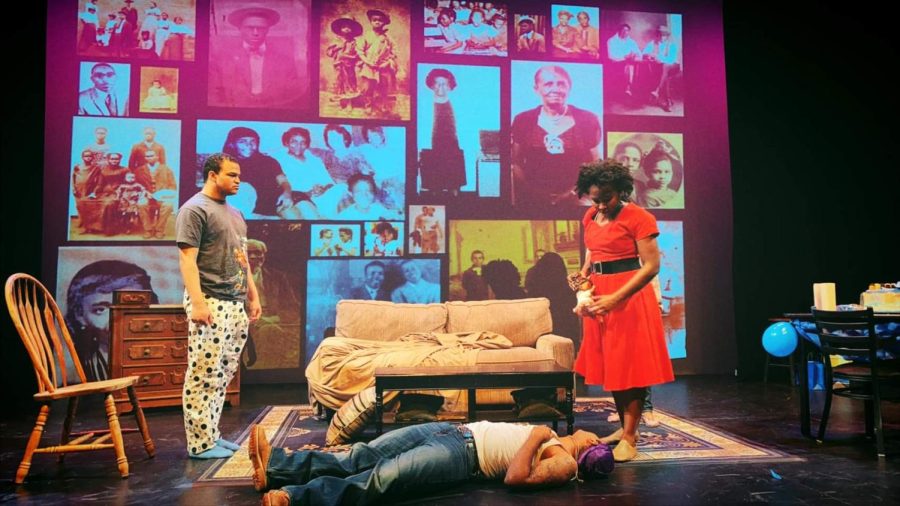UI production ‘Gwenevere’ tackles questions of race, masculinity, and family
Playwright Isaiah Reaves tells his story and experiences with his own intersectional identity combined with supernatural elements to create the play ‘Gwenevere.’
February 25, 2022
Isaiah Reaves was 11 years old when he was first inspired to start writing. After being transformed by reading the diary of Anne Frank, Reaves decided that he wanted to make a transformative difference with his own work.
After completing over 100 pages of his own adaptation of Frank’s diary, Reaves accidentally deleted the entire text. Devastated, he cried on his mom’s bed, coping with the loss of a project he had put a great deal of time and effort into.
The next day, Reaves was back to writing. Years later, at the age of 23, Reaves’ story Gwenevere is taking the stage at the University of Iowa.
Gwenevere is a play that tells the story of a young boy who is caught playing with a doll by his father. The play addresses questions regarding intersectionality, discussing the relationship between masculinity, gender roles, and race. The play premiered on Feb. 25, and will continue to show on Feb. 26-27 at the Alan MacVey Theatre.
“The entrance of a doll into this household wreaks havoc because the father, based on my father, really is fearful of what the implications of a boy playing with dolls mean,” Reaves said.
Reaves discussed that this play is semi-autobiographical. With multiple characters based on himself and his immediate family, supernatural forces are added to give an element of horror and divergence from the elements drawn from Reaves’ own life.
The piece is directed by Caroline S. Clay, assistant acting professor at the UI. Highly decorated as an actress, Clay used her experiences, perspective, and conversations with Reaves to transform the script from words on a page to an entire production on a stage.
“The amazing Caroline Clay is directing it,” Reaves said. “She’s our new acting faculty here this year. She’s an African American woman. She’s done Broadway, she’s done film, she’s done television, and she’s just helped me bring the story to life in a way that I think is going to blow everybody away.”
RELATED: The stories of four women are woven together in Dreamwell Theatre’s ‘The Revolutionists’
Reaves specifically asked for his play to be directed by a Black director to ensure that his story was told with care and accuracy. Before Clay was hired, there were not any faculty members or anyone in alignment to direct the piece.
“It’s one thing if a director of color says ‘I don’t care who directs it,’ but if it is culturally specific material that the playwright feels would be best amplified through the lens of a director of color, then they should have that,” Clay said. “That’s what we’re working on in terms of personnel and hiring and recruitment.”
Through working with Reaves, Clay said that a deep connection was born between them. Despite the difference in age and experience, Clay was inspired by Reaves’ authenticity and passion.
Clay mentioned that at one point that Reaves had intense writer’s block due to how personal the story was. In response, Clay quoted French author Andre Gide, saying that “man cannot discover new oceans unless he has the courage to lose sight of the shore.” With that idea in hand, Reaves proceeded to tell this story and heal in the process.
“It’s about this young boy standing in his truth, even before he had the language to even know that it was his truth and how the adults around him have had to adjust and had to educate themselves and have had to go on huge learning curves,” Clay said. “Isaiah is authentically who Isaiah is, and he’s not changing for anyone.”
Clay said that the UI continues to create a more inclusive environment for students of color to learn. While Gwenevere, a play by a Black playwright, a Black director, and an entirely Black cast, is certainly a step toward those initiatives being fulfilled, there is still improvement to be made regarding diversity, equity, and inclusion at the UI.
“To my surprise and gratitude 80 percent of our MFA acting cohort are black and Latinx,” Clay said. “We are really working on focusing on initiatives for undergraduate recruitment of color. It’s not at all where it needs to be, but it’s further than what it was.”















